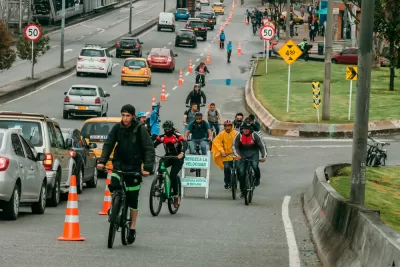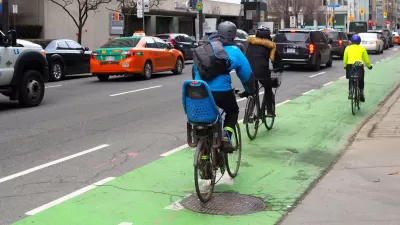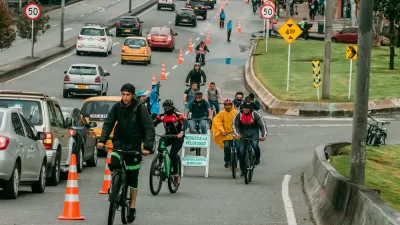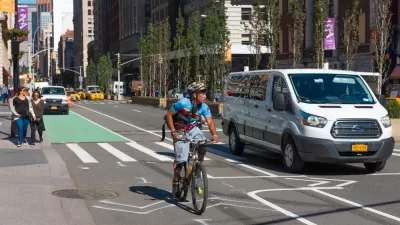Colombia's capital city, the birthplace of the Ciclovía, is devoting public space to bikes during lockdown. To reduce traffic, the city plans to allocate even more public space to bike infrastructure and sustainable mobility moving forward.

The city of Bogotá has engaged in what Andrea Jaramillo describes as a "bike-lane building spree that could be a model in Latin America" in an effort to mitigate a resurgence of traffic congestion after lockdown. "Currently, almost 7% of overall trips in Bogotá are on bicycles, more than in any other city in Latin America. But the city is aiming much higher: The long-term goal is to have 50% of total trips made on bikes or other micromobility alternatives such as scooters," writes Jaramillo.
Jaramillo's article describes Colombia's capital city's tried relationship with congestion and public transportation. Without a subway system, about 40% of the nation's trips make use of the TransMilenio bus rapid transit system. The famously traffic-laden city is also known for its narrow streets, densely populated neighborhoods, air pollution.
Mayor Claudia López wants to change the city's car-reliant reputation and reality by continuing the work for former mayor Enrique Peñalosa to increase bike infrastructure and encourage more Borotanos to travel by bike. "While 65% of households don’t own a car, 85% of the city’s public space is currently used up by motorized vehicles, Nicolás Estupiñán, Bogotá’s secretary of mobility, said in a webcast in June," reports Jaramillo. One step in the bike direction: setting aside a fifth of parking for bike lanes during the pandemic.
FULL STORY: Bogotá Is Building its Future Around Bikes

Planetizen Federal Action Tracker
A weekly monitor of how Trump’s orders and actions are impacting planners and planning in America.

Maui's Vacation Rental Debate Turns Ugly
Verbal attacks, misinformation campaigns and fistfights plague a high-stakes debate to convert thousands of vacation rentals into long-term housing.

Restaurant Patios Were a Pandemic Win — Why Were They so Hard to Keep?
Social distancing requirements and changes in travel patterns prompted cities to pilot new uses for street and sidewalk space. Then it got complicated.

In California Battle of Housing vs. Environment, Housing Just Won
A new state law significantly limits the power of CEQA, an environmental review law that served as a powerful tool for blocking new development.

Boulder Eliminates Parking Minimums Citywide
Officials estimate the cost of building a single underground parking space at up to $100,000.

Orange County, Florida Adopts Largest US “Sprawl Repair” Code
The ‘Orange Code’ seeks to rectify decades of sprawl-inducing, car-oriented development.
Urban Design for Planners 1: Software Tools
This six-course series explores essential urban design concepts using open source software and equips planners with the tools they need to participate fully in the urban design process.
Planning for Universal Design
Learn the tools for implementing Universal Design in planning regulations.
Heyer Gruel & Associates PA
JM Goldson LLC
Custer County Colorado
City of Camden Redevelopment Agency
City of Astoria
Transportation Research & Education Center (TREC) at Portland State University
Jefferson Parish Government
Camden Redevelopment Agency
City of Claremont





























